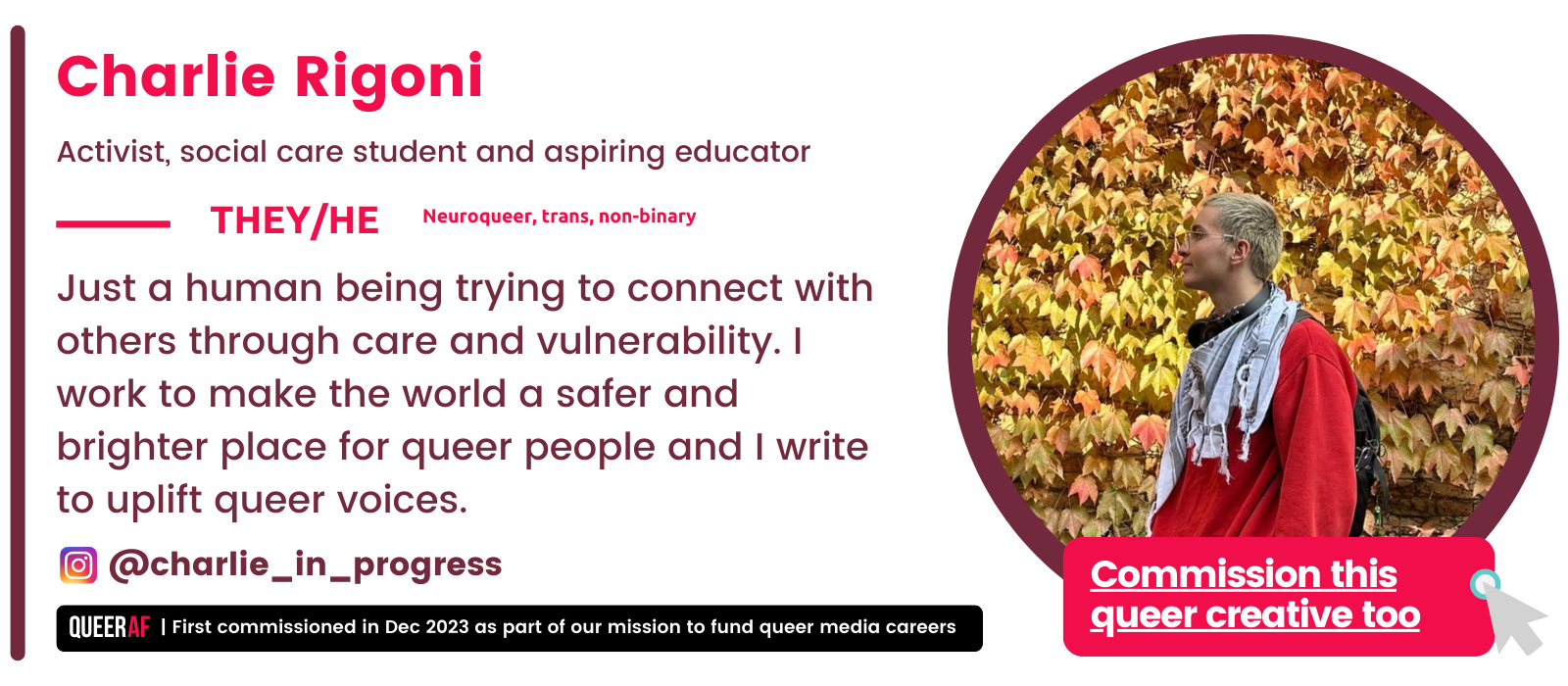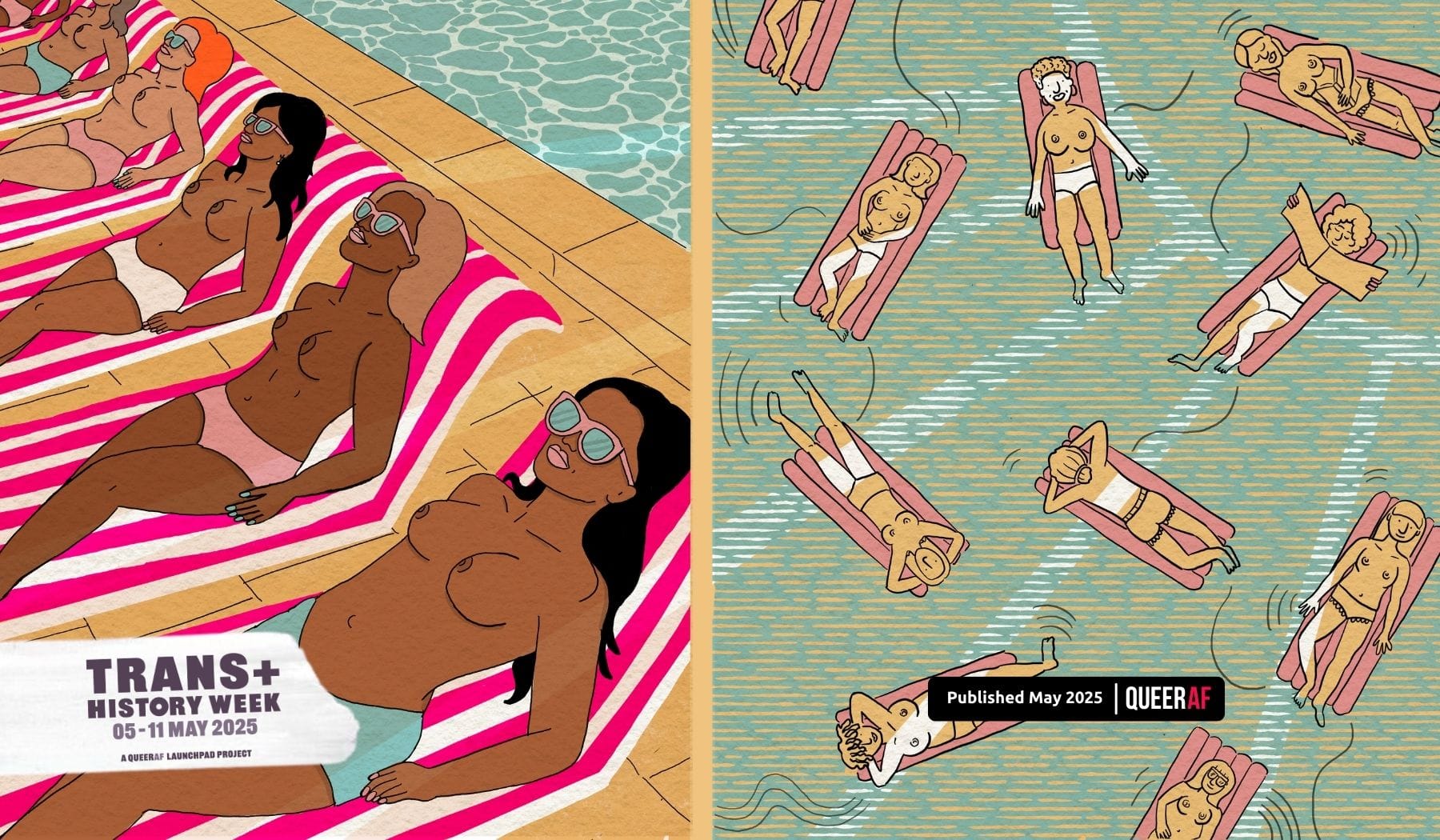
One summer in Milan, a group of trans women's topless protest was a spark to a wider movement in Italy that changed Trans+ rights across the country. In an age where single-sex spaces are facing such acute focus with laws and court rulings being introduced to define 'what a woman is', and rules that define where Trans+ can use public spaces, this history story, comes with a timely lesson. CW: References to police brutality and transphobia
Summer holidays stuck in the city meant one thing: heading to the public pool.
That’s what families and kids in Milan did to escape the heat of the 4th of July 1979. But among them on this particular day, was a group of trans women led by the activist Pina Bonanno. Wearing their bikinis and waving a sign saying, “We are transsexual, enough with discrimination” - they headed to the pool - Il Mulino
All at once, the women joyfully took off their bras, exposing their breasts. Guards panickedly rushed to tell them to dress up, as being topless was forbidden for women in the swimming pool: it was a public place ‘full of children after all’
‘Don’t worry, officer, everything is up to code, our documents say we are men, ’ the women said
They were all brought to the police station and accused of indecent exposure - Transgender Studies Quarterly
National newspapers called it a “provocative show” and made sure to use masculine pronouns, which I wasn’t surprised to read while researching this pivotal protest in Italian history.
But what did surprise me is the lack of resources there were to track down the history of this event. Not even the exact date was correctly reported, as some media claim it to be 1979, while others in 1980.
I hardly found pictures or names of those women who unapologetically claimed ownership over their bodies and gender expression, under the curious looks of the crowd - Mai annoiata
At first look, it makes you wonder if trans history really is such a fragile and superficial memory. But of course, what is much more likely is it has been swept under the carpet
These trans women’s simple act is considered to be one of the first trans-led protests in the country. It forced the country to examine the contradictory situation transgender people faced and put it into the public conversation - Le radici dell’orgoglio
It also inspired many other Trans people to come together, organize and demonstrate until a proper movement was founded in Bologna under the name MIT (Movimento Identità Trans).
At this protest, the trans community was asking for space and recognition, not only to the state and general public, but also in the broader queer community and feminist movements, where trans people were (and still are) too often excluded.
Protests like this led, with political support from the Radical Party to Italy’s first law ever recognising trans people's existence legally, as well as regulating regulating access to life-saving care like gender-affirming surgeries and creating a process for legal name change.
Until these changes, the majority of gender-diverse people only had two choices: working on sidewalks, constantly exposed to violence from police and clients, or hiding.
Laws didn’t recognize nor protect us, because we were not supposed to take up space in the public scene. The place society found for us was the closet, far from the spotlight, where the stable and binary system could not be challenged.
Public is a misnomer when spaces don’t belong to everybody. It is a privileged place where only “normal” people are welcomed.
The protest spoke a critical truth then, and it speaks truth now: we see every day attempts to erase trans existence. We are all concerned about trans people in the US not having their gender legally recognized in the name of women's safety and “biological truth”, and many European countries seem to be following this path - not least the UK whose Supreme Court redefined in one law, the legal definition of a woman to exclude Trans women.
Currently, under prime minister Giorgia Meloni’s rule, Italy is turning queer people’s lives into second class, with surrogacy now being punishable with reclusion and gender-affirming care being almost impossible to obtain, especially for Trans+ kids.
More than 40 years after that protest in Milan and after that first law about gender and name change, we still need therapists’, psychiatrists’ and judges’ approval to access gender-affirming care.
In front of these people, we still have to lie about our queerness, conform to gender stereotypes we don’t belong to, to have their permission to be ourselves. We are questioned if we divert from binary roles and expectations, and our obligated path gets longer and less accessible.

🎨 Artwork description, by Fox Fisher
"Visibility matters, but context matters more. Trans+ History Week provides that crucial context, showing the world, and ourselves, that our existence isn't a new phenomenon but a rich, enduring part of the human tapestry.
This year, collaborating with a writer and learning about the joyous resistance of Italian trans women added a vital dimension. Partnering with a writer allowed me to learn about and pay homage to a group of brave and defiant Italian trans women who wove joy and celebration into their resistance, finding brilliant ways to thrive and celebrate, even against the odds.
Knowing our history, the struggles and the triumphs, strengthens our roots and reminds everyone that we cannot, and will not, be erased"
Conservative political parties constantly ask to take queer books out of public libraries, impose teachers not to mention queer topics and push for the abolishment of alias careers/identity in schools. We are constantly reminded to “keep it private” with the excuse of protecting kids from ideologies and indoctrination and preserving traditional values.
It’s still urgent to get closer together and show up to make the trans experience more visible and accessible, and looking back to the people before us who made it possible for us to live as ourselves today, can come in rescue when we feel hopeless and useless/pointless/worthless.
Marcella di Folco, the first trans person to be elected to public office in Italy, said, “We live out of visibility”. Visibility is a powerful tool for reminding society that we exist and claiming our rights, no matter how many laws invalidate our experiences, and to show that conforming is not the only way to joy and pride. But it works best when it comes with understanding. The more people know us as individuals and people with stories - instead of from misconstrued newspaper lies, the more our visibility works for us.
Paola Astuni, an Italian trans activist, named the activism she did in the 70s and 80-s as “constructive rebellion”. She would say that “the only defence weapon from a repressive society is unity”.
What can we learn from this history?
Our strength comes from being a multitude and radically caring about each other; our community is where we can closely see the intersectional layers of privilege and oppression and dismantle brick after brick the system that endorses them.
Non-conforming bodies, considered socially unacceptable and out of place, have huge subversive power, especially when we collectively break in public places.
Porpora Marcasciano, another leading Italian trans activist, recently nominated for the Peace Nobel Prize, said during a speech, “Now more than ever trans bodies need to cross the public space. We have to demonstrate through our bodies, make our fabulousness more and more visible”.
The trans women who did this protest pointed out a clear contradiction in the law and were initially punished for it. But zoom out, and what we can see is their protest led to a revolution of change in Italy for Trans+ communities. And so with a hot summer headed our way, it leaves me with only one question to you: Wanna head to the pool?

Trans+ History Week will play a part in the fight back against anti-trans narratives - but it's not for them.
It's for us, to celebrate our history. It's for the over 20 Trans+ creative talent who have been paid, mentored and provided with equipment. It's for you, to take power from our history of enduring resilience.
We've run this initiative as an investment in the community and its beautiful creative talent - so we can help Trans+ journalists build media careers.
So much of what we think and feel comes from the media, and its a huge part of the reason anti-trans rhetoric has become normalised. That's why if you can change the newsroom, you can change the country.
As a not-for-profit, we reinvest everything into this mission - and mentoring schemes like we do with Trans+ History Week. That's why we need your help.
QueerAF's biggest source of revenue is from readers like you and our newsletters are ad-free. It helps us focus on our work, instead of chasing clicks for advertisers.
So please join as a QueerAF member now. Help us invest in Trans+ creatives to give our community the history lessons it needs - to win the fight back.










